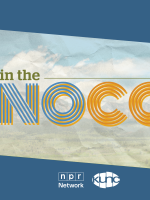Colorado has ambitious goals around renewable energy. Governor Jared Polis is aiming for to come from renewable sources by the year 2040.
But there’s an obstacle: Colorado doesn’t have enough power lines to deliver all that renewable energy from where it’s produced – often in rural parts of the state – to where it’s needed. A new study from the state’s Electric Transmission Authority found that over the next decade or two, just to keep up with demand.
Which is why clean energy advocates, and Gov. Polis, are intrigued by an unusual business model from a San Francisco-based .
The plan involves loading train cars with massive batteries filled with renewable energy. The trains would haul batteries from solar and wind farms in rural areas of Colorado to the cities and towns that need that electricity.
SunTrain’s President Christopher Smith and CEO Jeff Anderson have been working with Xcel Energy to pilot their idea. They hope to demonstrate the concept in Pueblo in 2026.
They spoke with Erin O’Toole about , and how much of an impact it could have on Colorado’s energy landscape.









